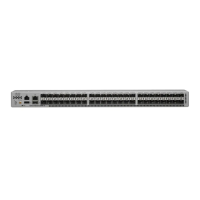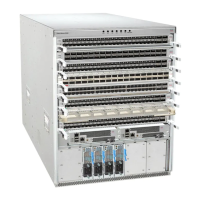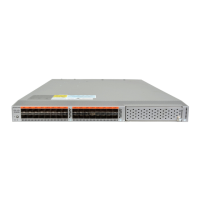344
Cisco Nexus 3548 Switch NX-OS Unicast Routing Command Reference
OL-27852-01
Chapter Unicast Routing Commands
set metric
set metric
To set the metric value for a routing protocol, use the set metric command. To return to the default metric
value, use the no form of this command.
set metric [+ | -] bandwidth-metric
set metric bandwidth-metric [delay-metric reliability-metric load-metric mtu]
no set metric
Syntax Description
Command Default None
Command Modes Route-map configuration mode
Command History
Usage Guidelines
Note We recommend that you consult your Cisco technical support representative before changing the default
value.
When you confiture the reliability-metric and the load-metric arguments, 255 means 100 percent
reliability.
Use the + or - keywords to modify the existing delay metric value. You can modify only the delay metric
with these keywords.
Use the route-map global configuration command and the match and set route-map configuration
command to define the conditions for redistributing routes from one routing protocol into another. Each
route-map command has a list of match and set commands associated with it. The match commands
specify the match criteria—the conditions under which redistribution is allowed for the current
+ (Optional) Adds to the existing delay metric value.
- (Optional) Subtracts from the existing delay metric value.
bandwidth-metric Interior Gateway Routing Protocol (IGRP) bandwith metric, in Kb/s. The range
is from 0 to 4294967295.
delay-metric (Optional) Interior Gateway Routing Protocol (IGRP) delay metric, in 10
microsecond units. The range is from 1 to 4294967295.
reliability-metric (Optional) IGRP reliability metric. The range is from 0 to 255.
load-metric (Optional) IGRP load metric. The range is from 1 to 255.
mtu (Optional) IGRP maximum transmission unit (MTU) of the path. The range is
from 1 to 4294967295.
Release Modification
5.0(3)A1(1) This command was introduced.

